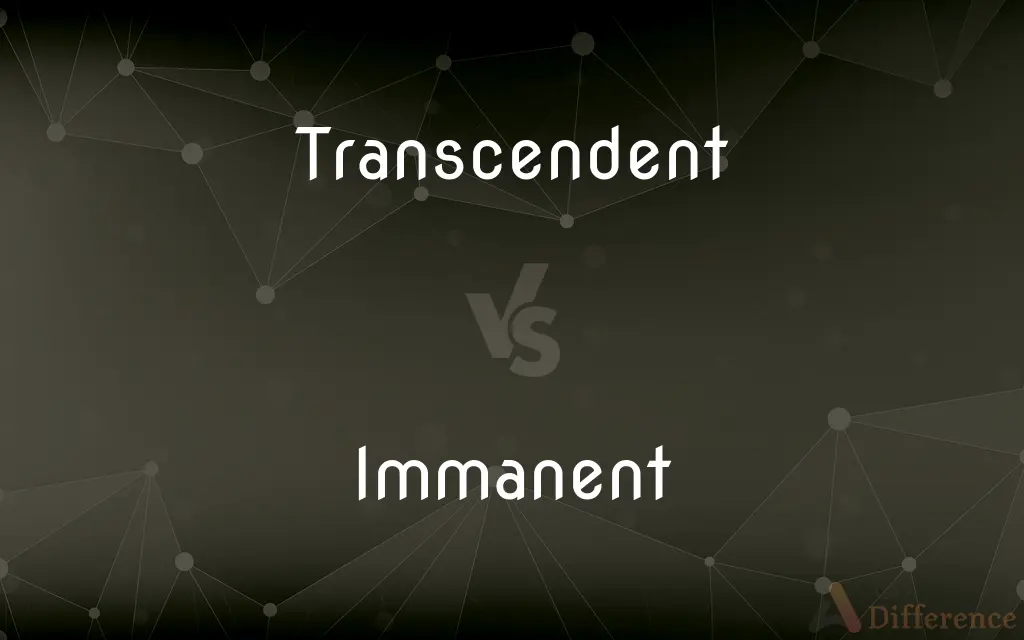Transcendent vs. Immanent — What's the Difference?
By Tayyaba Rehman — Updated on November 4, 2023
Transcendent refers to something that exists beyond the normal or physical human experience, implying a higher state or plane. In contrast, immanent describes a presence or operation within the physical realm, denoting an inherent or intrinsic quality.

Difference Between Transcendent and Immanent
Table of Contents
ADVERTISEMENT
Key Differences
Transcendence refers to the aspect of a deity's nature and power which is wholly independent of the material universe, beyond all physical laws. This is contrasted with immanence, where a deity is said to be fully present in the physical world and thus accessible to creatures in various ways. In religious experience, the transcendent is the aspect of God that is wholly separate from the material world, while the immanent aspect refers to God's presence within the universe, within the self, and within others.
The concept of the transcendent often implies a reality that is beyond our comprehension and cannot be experienced directly. This contrasts with the idea of the immanent, which is understood as present throughout the material world and thus can be experienced by individuals in everyday life. Transcendent entities are often regarded as beyond the grasp of mundane understanding and perception, whereas immanent entities are seen as pervasive throughout the physical realm and intimately connected to human life.
Transcendence conveys a sense of otherworldliness and often relates to ideas of divinity, spirituality, and the supernatural, exceeding the limits of the known physical universe. Conversely, immanence denotes a presence within the universe, accessible and operating within the confines of the material world. The transcendent implies a surpassing or going beyond ordinary limits, whereas the immanent suggests a presence within those very limits.
While the transcendent is sometimes associated with a distant, impersonal force that is far removed from our daily existence, immanence suggests a close, intimate connection with the divine or the universe. One might think of the transcendent as something that exists above and beyond our physical reality, while the immanent dwells deeply within the fabric of our everyday lives, actively a part of the world and its processes.
To discuss the transcendent is to speak of what is beyond the scope of our experience, an elevated state or being that transcends the universe, time, and space. On the flip side, the immanent refers to what dwells within and pervades the natural world, an omnipresent aspect of reality that is entwined with the very essence of our being and the environment.
ADVERTISEMENT
Comparison Chart
Relation to the Universe
Beyond and external to the universe.
Within and throughout the universe.
Accessibility
Not directly accessible, beyond human experience.
Directly accessible, part of human experience.
Inherent/Intrinsic
Not inherent to the world, separate.
Inherent to the world, integral.
Perception
Cannot be perceived by the senses.
Can be perceived or experienced.
Nature of Existence
Independent of the material world.
Intimately connected to the material world.
Compare with Definitions
Transcendent
Lying beyond the limits of all possible experience and knowledge.
The philosopher spoke of a transcendent reality that existed outside the bounds of time.
Immanent
Remaining within; indwelling; inherent.
There is an immanent charm in her simplicity that captivates everyone.
Transcendent
Surpassing the ordinary; exceptional.
His transcendent performance set a new benchmark for athletes worldwide.
Immanent
Existing or operating within; inherent.
The immanent beauty of the natural world was breathtaking.
Transcendent
Exceeding or surpassing usual limits especially in excellence.
The artist’s work was transcendent, captivating audiences with its originality.
Immanent
Philosophically, existing throughout the material world, not transcendent.
The laws of mathematics are immanent in the universe, revealing a deep structure to reality.
Transcendent
Being beyond comprehension.
The concept of infinite space is transcendent to the human mind.
Immanent
Permanently pervading and sustaining the universe.
Many pantheistic beliefs hold that the divine is immanent in all things.
Transcendent
Beyond or above the range of normal or physical human experience
The search for a transcendent level of knowledge
Immanent
Existing or operating within; inherent
The protection of liberties is immanent in constitutional arrangements
Transcendent
(in scholastic philosophy) higher than or not included in any of Aristotle's ten categories.
Immanent
Existing or remaining within; inherent
Believed in a God immanent in humans.
Transcendent
Surpassing others; preeminent or supreme.
Immanent
Restricted entirely to the mind; subjective.
Transcendent
Lying beyond the ordinary range of perception
"fails to achieve a transcendent significance in suffering and squalor" (National Review).
Immanent
Naturally part of something; existing throughout and within something; intrinsic.
Transcendent
Transcending the Aristotelian categories.
Immanent
(philosophy) Of something which has always already been.
Transcendent
In Kant's theory of knowledge, being beyond the limits of experience and hence unknowable.
Immanent
Restricted entirely to the mind or a given domain; internal; subjective.
Transcendent
Being above and independent of the material universe. Used of the Deity.
Immanent
Existing within and throughout the mind and the world; dwelling within and throughout all things, all time, etc. Compare transcendent.
Transcendent
Surpassing usual limits
Immanent
Taking place entirely within the mind of the subject and having no effect outside of it. Compare emanant, transeunt.
Transcendent
Supreme in excellence
Immanent
Being within the limits of experience or knowledge.
Transcendent
Beyond the range of usual perception
Immanent
Remaining within; inherent; indwelling; abiding; intrinsic; internal or subjective; hence, limited in activity, agency, or effect, to the subject or associated acts; - opposed to emanant, transitory, transitive, or objective.
A cognition is an immanent act of mind.
An immanent power in the life of the world.
Transcendent
Free from constraints of the material world
Immanent
Of a mental act performed entirely within the mind;
A cognition is an immanent act of mind
Transcendent
That which surpasses or is supereminent; something excellent.
Immanent
Of qualities that are spread throughout something;
Ambition is immanent in human nature
We think of God as immanent in nature
Transcendent
Very excellent; superior or supreme in excellence; surpassing others; as, transcendent worth; transcendent valor.
Clothed with transcendent brightness.
Transcendent
Transcending, or reaching beyond, the limits of human knowledge; - applied to affirmations and speculations concerning what lies beyond the reach of the human intellect.
Transcendent
That which surpasses or is supereminent; that which is very excellent.
Transcendent
Beyond and outside the ordinary range of human experience or understanding;
Philosophers...often explicitly reject the notion of any transcendent reality beyond thought...and claim to be concerned only with thought itself...
The unknowable mysteries of lifer
Transcendent
Exceeding or surpassing usual limits especially in excellence
Transcendent
Beyond or above the range of normal or merely physical human experience.
She sought a transcendent level of knowledge, beyond what was taught in classrooms.
Common Curiosities
Is transcendent synonymous with supernatural?
Transcendent often relates to the supernatural, as it denotes what is beyond the natural world, but it's not strictly synonymous as it can apply to concepts like beauty or excellence.
What does it mean when philosophers say reality is immanent?
It means they view reality as inherently present within the material world and accessible through experience.
How is immanent different from transcendent?
Immanent refers to something that exists or operates within and is inherently part of the world, while transcendent refers to that which is beyond or above the physical world.
Can something be both transcendent and immanent?
In some theological perspectives, the divine is seen as both transcendent (beyond the universe) and immanent (within the universe).
What does transcendent mean?
Transcendent means going beyond normal limits or exceeding typical human experience.
Is immanence a religious concept only?
No, immanence can be used in both religious and secular contexts to describe concepts that are inherently present and active within the world.
Can nature be described as immanent?
Yes, nature can be described as immanent because it represents a presence and force that is intrinsic and operative within the physical world.
Does transcendent imply a higher value than immanent?
Not necessarily; the value is subjective and dependent on the context in which these terms are used.
Can human beings experience the transcendent?
While the transcendent is by definition beyond normal human experience, many religions and philosophies hold that humans can have transcendent experiences, often through spirituality or art.
Can science study transcendent phenomena?
Since transcendent phenomena are said to be beyond physical laws and experience, they generally fall outside the scope of empirical science.
How does the transcendent relate to art?
In art, the transcendent can refer to an experience or quality that surpasses ordinary limits and speaks to a higher sense of beauty or truth.
In philosophy, how is immanence used?
Immanence is often used to describe philosophies that hold reality to be accessible, knowable, and experienced directly.
Is the concept of immanence limited to divinity?
No, immanence can apply to any quality or force that is viewed as inherently existing within and pervading the material realm.
Is immanence relevant in environmental ethics?
Yes, in environmental ethics, the concept of immanence can be important in recognizing the inherent value and interconnection of all life within the ecosystem.
Do all religions believe in a transcendent deity?
Not all; some religions emphasize a transcendent deity while others focus on the immanent nature of the divine or spiritual.
Share Your Discovery

Previous Comparison
Hut vs. House
Next Comparison
Need vs. NeedsAuthor Spotlight
Written by
Tayyaba RehmanTayyaba Rehman is a distinguished writer, currently serving as a primary contributor to askdifference.com. As a researcher in semantics and etymology, Tayyaba's passion for the complexity of languages and their distinctions has found a perfect home on the platform. Tayyaba delves into the intricacies of language, distinguishing between commonly confused words and phrases, thereby providing clarity for readers worldwide.
















































